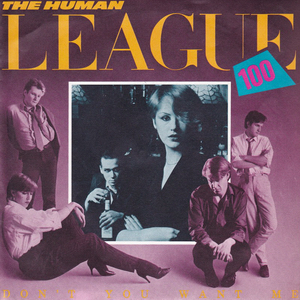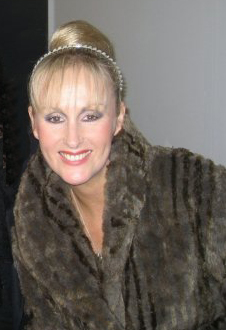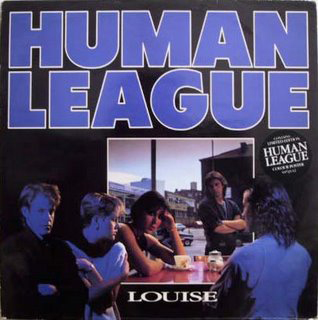
The Human League is an English synth-pop band formed in Sheffield in 1977. Initially an experimental electronic outfit, the group signed to Virgin Records in 1979 and later attained widespread commercial success with their third album Dare in 1981 after restructuring their lineup. The album contained four hit singles, including the UK/US number one hit "Don't You Want Me". The band received the Brit Award for Best British Breakthrough Act in 1982. Further hits followed throughout the 1980s and into the 1990s, including "Mirror Man", "(Keep Feeling) Fascination", "The Lebanon", "Human" and "Tell Me When".

Travelogue is the second full-length studio album released by British synth-pop group The Human League, released in May 1980. It was the last album with founding members Ian Craig Marsh and Martyn Ware, as they would leave to form Heaven 17 later that year.

Crash is the fifth studio album by English synth-pop band the Human League, released on 8 September 1986 by Virgin Records. The album would provide the band with their second US number-one single, "Human", the same year. It was produced by the American production team of Jimmy Jam and Terry Lewis, who also wrote several tracks.

Philip Oakey is an English singer, songwriter and record producer. He is the lead singer, songwriter, and co-founder of the synth-pop band the Human League. Aside from the Human League, Oakey has enjoyed an extensive solo music career and has collaborated with numerous other artists and producers.

Dare is the third studio album by English synth-pop band the Human League, first released in the United Kingdom in October 1981 then subsequently in the US in mid-1982. The album was produced by Martin Rushent and recorded between March and September 1981, following the departure of founding members Martyn Ware and Ian Craig Marsh, and saw the band shift direction from their previous avant-garde electronic style toward a more pop-friendly, commercial sound led by frontman Philip Oakey.

"Don't You Want Me" is a song by British synth-pop group the Human League. It was released on 27 November 1981 as the fourth single from their third studio album, Dare (1981). The band's best known and most commercially successful song, it was the best selling UK single of 1981, that year's Christmas number one, and has since sold over 1,560,000 copies in the UK, making it the 23rd-most successful single in UK Singles Chart history. It topped the Billboard Hot 100 in the US on 3 July 1982, where it stayed for three weeks.

Joanne Catherall is an English singer who is one of two female vocalists in the English synth-pop band The Human League.

"Human" is a song by English synth-pop band the Human League, released as the lead single from their fifth studio album, Crash (1986). The track, which deals with the subject of infidelity, was written and produced by Jimmy Jam and Terry Lewis. The song topped the charts of the United States, becoming the band's second single to top the Billboard Hot 100 after their 1981 single "Don't You Want Me". It also went to number one in Canada while reaching number five in Germany and number eight in the band's native United Kingdom.

Hysteria is the fourth studio album by the English synth-pop band the Human League, released on 7 May 1984 by Virgin Records. Following the worldwide success of their previous studio album Dare (1981), the band struggled to make a successful follow-up and the sessions for Hysteria were fraught with problems. The album title itself is taken from the problematic recording period. Producers Martin Rushent and Chris Thomas both left the project which would eventually be finished by producer Hugh Padgham.

Octopus is the seventh full-length studio album recorded by the British synth-pop band The Human League. It was produced by the former Tears for Fears keyboard player Ian Stanley and released by EastWest Records in 1995. It was the first new album from The Human League in five years after the termination of their long-term contract with Virgin Records. Octopus was the first Human League album that presented the band as a trio consisting of the singers Philip Oakey, Joanne Catherall and Susan Ann Sulley. The former Human League member Jo Callis and keyboard player Neil Sutton also contributed to the writing of the album.

Susan Ann Sulley, formerly known as Susanne Sulley and Susan Ann Gayle, is an English singer who is one of the two female vocalists in the synth-pop band The Human League.

"All I Ever Wanted" is a song by English synth-pop band the Human League. It is taken from the Secrets album of 2001 and was released as its first single. It is currently their most recent single released on a major label. It follows the standard Human League style of baritone lead vocals of Philip Oakey with choruses and incidentals jointly shared between female co-vocalists Joanne Catherall and Susan Ann Sulley. It was released in July 2001 and stalled at number 47 in the UK Singles Chart.

"The Sound of the Crowd" is a song by the British synth-pop group The Human League. It became the band's commercial breakthrough, reaching #12 on the UK Singles Chart in May 1981.

"Open Your Heart" is a song by the British synth-pop group The Human League. It was released as a single in the UK in October 1981 and peaked at number six in the UK Singles Chart. It was written jointly by lead singer Philip Oakey and keyboard player Jo Callis. The song features a lead vocal by Oakey and female backing vocals by Susanne Sulley and Joanne Catherall, analogue synthesizers by Jo Callis, Philip Adrian Wright and Ian Burden. Drum machines, sequencing and programming were provided by producer Martin Rushent.

"Love Action (I Believe in Love)" is a song by the British synth-pop group The Human League, released as a single in the UK in July 1981. It became the band's first Top 10 success, peaking at number three in the UK Singles Chart.

"I Don't Depend on You" is a disco-influenced song by the British synth-pop group the Human League released under the pseudonym The Men. It was released as a single in the UK in July 1979, but failed to chart. It was written by Philip Oakey, Martyn Ware and Ian Craig Marsh; was produced by Colin Thurston and featured guest backing vocalists Katie Kissoon and Lisa Strike.

"Soundtrack to a Generation" is a song by English synth-pop band the Human League. It is taken from the album Romantic?, from 1990.

"Louise" is a song by English synth-pop band the Human League. It was released as a single in the UK on 11 November 1984 and peaked at number thirteen in the UK Singles Chart. It was written jointly by lead singer Philip Oakey with fellow band members Jo Callis and Philip Adrian Wright. The song features a lead vocal by Oakey and female vocals by Susan Ann Sulley and Joanne Catherall, analogue synthesizers by Philip Oakey, Jo Callis, Philip Adrian Wright and Ian Burden. The producers were Chris Thomas and Hugh Padgham. Although enjoying modest success when released as a single, it appeared on Melody Maker’s list of 50 top singles of 1984.

"Love Is All That Matters" is a song by British synth-pop group the Human League. It was the third single to be taken from their fifth studio album, Crash (1986). It was released in 1986 in the US, where it did not chart. The single would be reissued in 1988 to promote the band's first greatest hits album; this version of the single featured a different tracklist and was released in every territory but the US.

YMO Versus The Human League is an EP released in Japan and Asia in April 1993. It was released by Alfa Records and is a collaboration between Japanese electropop/synthpop band Yellow Magic Orchestra and British new wave/synthpop band The Human League. It was the first release by The Human League after their abrupt dismissal from their 14-year-long recording contract with Virgin Records 10 months previously.




















